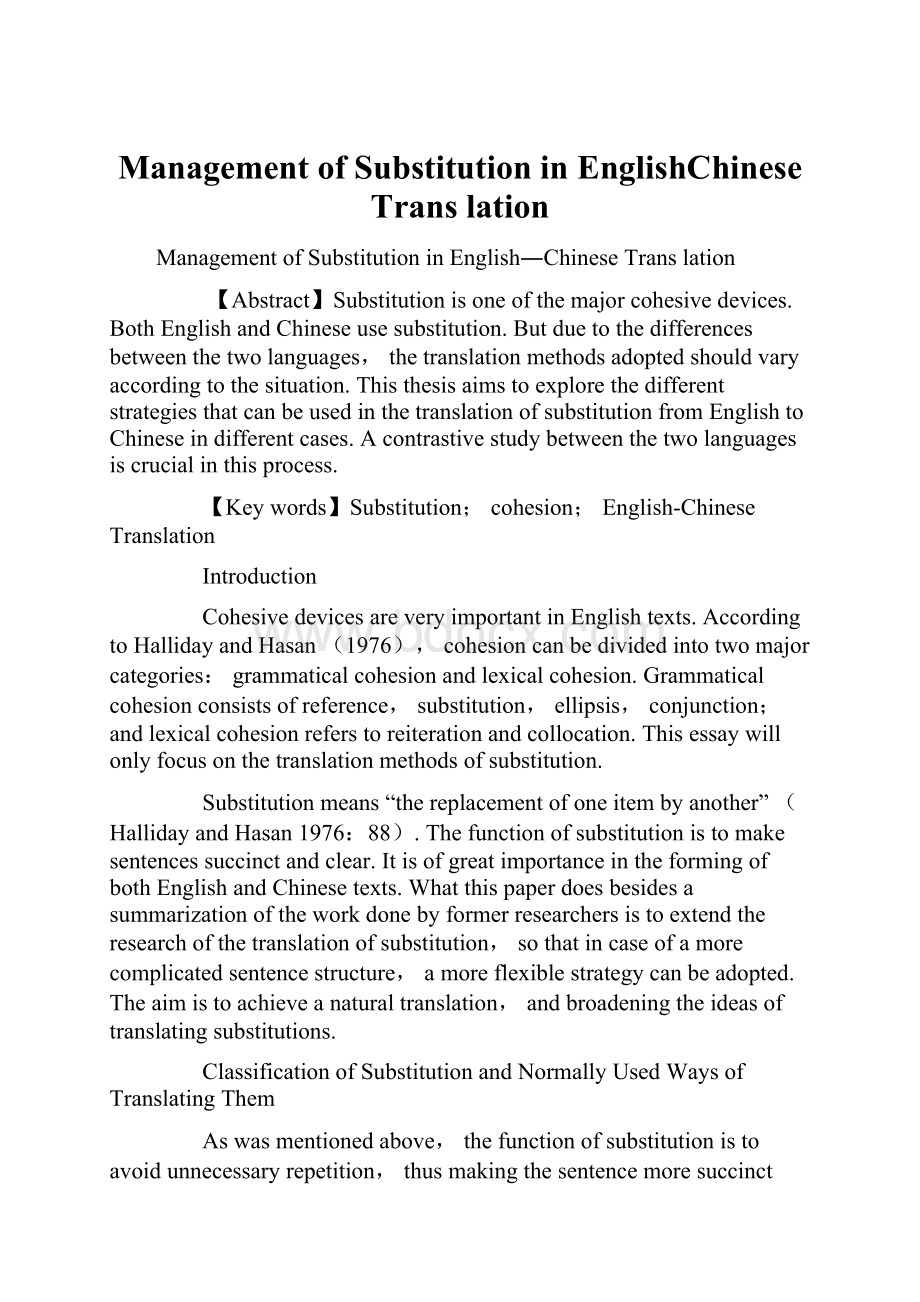Management of Substitution in EnglishChinese Trans lation.docx
《Management of Substitution in EnglishChinese Trans lation.docx》由会员分享,可在线阅读,更多相关《Management of Substitution in EnglishChinese Trans lation.docx(6页珍藏版)》请在冰豆网上搜索。

ManagementofSubstitutioninEnglishChineseTranslation
ManagementofSubstitutioninEnglish―ChineseTranslation
【Abstract】Substitutionisoneofthemajorcohesivedevices.BothEnglishandChineseusesubstitution.Butduetothedifferencesbetweenthetwolanguages,thetranslationmethodsadoptedshouldvaryaccordingtothesituation.ThisthesisaimstoexplorethedifferentstrategiesthatcanbeusedinthetranslationofsubstitutionfromEnglishtoChineseindifferentcases.Acontrastivestudybetweenthetwolanguagesiscrucialinthisprocess.
【Keywords】Substitution;cohesion;English-ChineseTranslation
Introduction
CohesivedevicesareveryimportantinEnglishtexts.AccordingtoHallidayandHasan(1976),cohesioncanbedividedintotwomajorcategories:
grammaticalcohesionandlexicalcohesion.Grammaticalcohesionconsistsofreference,substitution,ellipsis,conjunction;andlexicalcohesionreferstoreiterationandcollocation.Thisessaywillonlyfocusonthetranslationmethodsofsubstitution.
Substitutionmeans“thereplacementofoneitembyanother”(HallidayandHasan1976:
88).Thefunctionofsubstitutionistomakesentencessuccinctandclear.ItisofgreatimportanceintheformingofbothEnglishandChinesetexts.Whatthispaperdoesbesidesasummarizationoftheworkdonebyformerresearchersistoextendtheresearchofthetranslationofsubstitution,sothatincaseofamorecomplicatedsentencestructure,amoreflexiblestrategycanbeadopted.Theaimistoachieveanaturaltranslation,andbroadeningtheideasoftranslatingsubstitutions.
ClassificationofSubstitutionandNormallyUsedWaysofTranslatingThem
Aswasmentionedabove,thefunctionofsubstitutionistoavoidunnecessaryrepetition,thusmakingthesentencemoresuccinctandconcise.Asoneofthemajorcohesivedevice,itcontributestothebindingofsentencesandsmoothnessofthetext.
HallidayandHasan(1976)dividedsubstitutionintothreegroups:
nominal,verbalandclausal.
Nominalsubstitutionmostlyinvolvestheuseof“one”,“ones”and“same”assubstitutionitems.Whenusedinsubstitution,theyalwaysfunctionastheHeadofanominalgroup.InChinese,thereisnocompleteequivalentfortheEnglishsubstitutionform“one”.Normally,thiskindofsubstitutioncanbetranslatedas“…的”or“…者”.Forexample:
ST:
Myaxeistooblunt.Imustgetasharperone.(HallidayandHasan1976)
TT:
我的斧子太钝了。
我得去买把锋利的。
Here,“one”istranslatedas“锋利的”.“锋利的”isactuallyauseofellipsisinChinese.Thefullsentenceshouldbe“我得去买把锋利的斧子。
” Hereisanotherexamplewhere“one”canbetranslatedas“…者”:
ST:
Thenewbooksarequiteuseful,buttheoldonesarenottotallyuselessaswell.
TT:
新书十分有用,但是陈旧者也未必完全无用。
“者”herefunctionsexactlyasthe“one”intheEnglishtext.Butthereissomethingtobenoticedwhentranslatingsubstitutiondevicesinto“者”,thatis,“者”indicatesaclassicalstyleofwriting.
Inothercases,nominalsubstitutioncanbetranslatedbyusingrepetitioninChinese.ThisisbecausetheChineselanguagehasahabitofusingthesamewordstobalancethesentenceweightandtomakethesentencesmorerhythmic.ButEnglishtendstoavoidrepetitionasmuchaspossibleunlessthereisaspecialneed,hencetheuseofsubstitution.Forexample:
ST:
Inafewmomentsarevolverwasheard.Theywaitedforasecondone,buttherewasonlysilence.
TT:
不一会儿,听到一声左轮枪响。
他们等待第二声枪响,但只有一片寂静。
Here,“枪响”ismentionedagainbecauseoftherhymeofthesentence.
Thereisonlyonewordforverbalsubstitution,whichis“do”,includingitsmorphologicalscatter“do”,“does”,“doing”,“did”,“done”anditsinflection“doso”,etc.Itisasubstitutionofaverboraverbalphraseinthesentence.AndsinceChinesealsohavesomeverbsthatshareasimilarfunctioninthesentence,like“来”,“弄”,“搞”,“做”,etc.,thiskindofsubstitutionwillmostlybetranslatedtoitsChinesecounterpart.Forexample:
English:
Youaretoobusytocleantheroom.Letmedoit.
Chinese:
你太忙,没有时间打扫房间。
让我来吧。
(ChenandLi2004:
67)
The“来”herecantotallybesubstitutedwithanotherChineseverb,like“弄”or“搞”or“做”,etc.
Inotheroccasions,amethodofrepetitioncanalsobeusedwhentranslatingverbalsubstitution,asin:
English:
YouthinkJoanalreadyknows?
?
CIthinkeverybodydoes.(Baker2001:
186)
Chinese:
你觉得琼已经知道了?
――我觉得所有人都知道了。
Clausalsubstitutionisanothertypeofsubstitutioninwhichthepresupposedelementisanentireclause.Themostoftenusedwordsare“so”and“not”.Correspondingtothese,Chineseuses“(不)这样”,“(不)这么”,“(不)是”,“不然”,and“要不”.SonormallyitisrathereasytofindanexactequivalenceintheChineselanguagewhentranslatingthiskindofsubstitution.Forexample:
English:
Doyouthinkhewastooserious?
?
CYes,Ithinkso.
Chinese:
你看他是不是太认真了?
――不错,我想是这样的。
(He2002:
484)
ContrastiveStudiesofEnglishandChineseLanguageStructuresRelatedtotheTranslationofSubstitution EnglishasanorthographiclanguageisverydifferentfromChinese,whosecharactersareideographic.Theirdifferenceinnatureleadstotheirdiscrepanciesingrammarandlanguagestructures.
JiangJiansongmakescomparisonbetweenEnglishandChineseinsixaspects:
hypotaxisandparataxis,inanimatesubjectandanimatesubject,activeandpassive,stativeanddynamic,contractionandextension,subjectandtopic.Amongthese,themostfundamentaldifferenceinEnglishandChinesegrammaristhatofhypotaxisandparataxis(Jiang2002:
3).ThatmeansthesemanticmeaninginEnglishislargelyembeddedinitsform,whilethatoftheChineselanguageisnot.AnotherlanguagefeatureofEnglishisthatitsbasicsentencestructureisbranchingtotheright,becauseithasplentyofmorphologicalvariations(Zhou2003:
135).AndsinceChinesehasnomorphologicalvariations,ithastodependonsemanticcoherenceandwordordertoarrangethesentence,sothebranchingpatterniscomparativelyflexible(ibid).Thesetwodifferencesarebothrelatedtothetranslationofsubstitution.
Asissuggestedbymanyscholars,whentranslatingEnglishintoChinese,translatorswillnormallybreakthegrammaticalstructuresoftheoriginaltext,graspthemeaningonlyandthenorganizethemeaningagaininChinese.
ATranslationComparisonofaMoreComplicatedCase
ThissentenceappearsinaBBCculturalprogramme.Thearticleisaboutthestoryofalostparadise,Shangri-La.
English:
ThestoryofShangri-Laitselfisamodernone,toldbytheEnglishnovelistJamesHiltoninhisnovelLostHorizon(1933).(Wood2011)
Thesubstitutionelement“one”hereishardtotranslatebecauseofthedescriptiveelementafterthecomma.Itisasubstitutionof“story”.Aswasmentionedbefore,thebasicsentencestructureofEnglishisbranchingtotherightduetoitsstrictformandgrammar.ButChinesesentencestructureisratherfree,andadescriptiveelementlikethisdoesnotexistintheChineselanguage.Sotransferringmeaningshouldbethepriorityinthistask,whiletheformiscomparativelylessimportant.Inthiscase,ifthesimpletranslationmethodsmentionedabovewouldstillbefollowed,anaturalandfluenttranslationwouldnotbeachieved.Ananalysisofthesentenceshouldbedonehere.
Overallthissentencehasfourlayersofmeaningthatneedstobetranslated.Thefirstmeaningis:
ThestoryofShangri-Laitselfisamodernone.Thesecondmeaningis:
ItistoldbytheEnglishnovelistJamesHilton.Thethirdmeaningis:
HetoldaboutitinhisnovelLostHorizon.Andthefourthmeaningis:
Thenovelispublishedin1933.SoifatranslationcanassemblethesemeaningstogetheragaininanaturalChineselanguage,itshouldbeagoodtranslation. Thefollowingisthecomparisonoftwodifferenttranslationsofthissentence.
Translation1:
香格里拉是英国作家詹姆斯?
希尔顿在他的小说《消失的地平线》(1933年出版)一书中所描绘的当代人间天堂。
Inthistranslation,thetranslatordecidestomovethedescriptiveelementforward,andtranslatethesubstitutionitem“one”as“modernearthlyparadise”.AllthefourmeaningshavebeenclearlystatedinafluentChineseway.Sothistranslationisrathergood.TheonlyproblemisthatthedescriptiveelementistoolongandcreatesforegroundingwhenreadaboutitinChinese.Soitisalittleunnatural.
Nowlet’stakealookatthesecondtranslation.
Translation2:
香格里拉是个现代故事,故事的作者是英国小说家詹姆斯?
希尔顿。
1933年他出版了一部小说《消失的地平线》,其中……
Inthistranslation,thetranslatorchoppedthesentenceintosmallsegmentswhichistotallydifferentfromtheoriginalsentenceinform.Thetranslatorevenbreakstheboundariesofthesentence,andmixesthethirdandfourthmeaningsegmentswiththenextsentence.Sohereforthistranslator,thetranslationunithasbeenbroadeningtoatextlevelinsteadofasentencelevel.ThistranslationworkreadsmorelikeanoriginalChinesetalking,soitismorenaturalthanthefirstone,andnoforegroundingcreatedeither.Theonlylossistheform,whichisnotofgreatimportanceintheChineselanguage.
Conclusion
SubstitutionisanimportantcohesivedevicebothinEnglishandinChinese.Buttheusesofthemareverydifferentbetweenthetwolanguages.Normallythesubstitutionitemcanbeeasilytranslatedandanequivalentpartisnotveryhardtofind.However,sometimeswhenthesentencestructurebecomesmorecomplicated,aflexiblestrategyshouldthenbeadopted.Inwhicheverway,toachievethetransferenceofthemeaningisthetoppriorityofEnglish-Chinesetranslationpracticeinmostcases.
References:
[1]Baker,M.(2001).InOtherWords.1stedn.London:
Routledge.
[2]Chen,H.andLi,Y.(ed.)(2004)ANewCoursebookonChinese-EnglishTranslation.Shanghai:
ShanghaiForeig